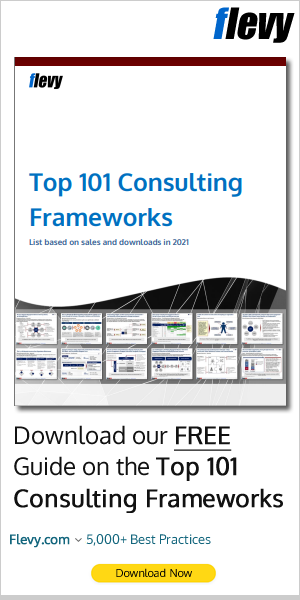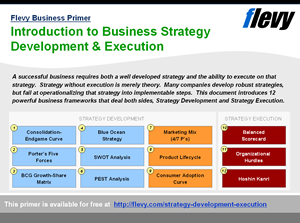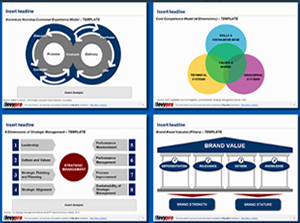Editor's Note: Take a look at our featured best practice, Strategic Foresight and Uncertainty (51-slide PowerPoint presentation). Even before COVID-19, the world has been witnessing accelerating change and increasing complexity, partly due to the speed of technological development and adoption. Strategic foresight includes a collection of method to help consider and anticipate an array of possible futures that could [read more]
How Companies Are Responding to the COVID-19 Pandemic
* * * *

Thus, the pandemic opened an unprecedented opportunity for these corporate leaders to exercise leadership and responsibility during the crisis. Many industries and businesses have taken various courses of action as a response to COVID-19, despite experiencing operational and financial challenges in itself.
We’ve listed below a few measures commonly undertaken by the capitalist sector to combat the effects of the COVID-19 pandemic.
Ramping up COVID-19 testing
It has been a priority of communities all over the world to test for COVID-19 antibodies. Tests are done to monitor the transmission of the virus and stop its spread by separating infected people from non-infected ones.
The corporate sector has taken part in the drive to increase the number of tests conducted. Companies like Smithfield Foods, Inc., Ford Motor Co., and United Health Group, Inc., have begun regular testing of employees.
Home testing companies, like Everlywell, have also ramped up their production of COVID-19 home testing kits to increase the number of COVID-19 tests that may be conducted in communities.
This way, they can ensure that no personnel runs the risk of transmitting the disease to others while the business slowly operates under strict government guidelines. This initiative is also done to ensure business continuity and resiliency.
Promoting Hand Hygiene
Without a vaccine, hand hygiene is the most reliable method to prevent transmission of coronavirus. That being said, businesses have taken part in promoting hand hygiene in their establishments, public places, and, especially, hospitals.
Following the recommendation of the World Health Organization, most companies have placed hand washing stations, rubbing alcohol, and anti-bacterial gels readily available to the public. This initiative is done to ensure that no person is without access to proper hand hygiene while in common areas. With this, businesses hope to lessen the transmission of the virus among people within said premises.
Also, chemical companies capable of producing rubbing alcohol and hand sanitizers have ramped up the production of said items for distribution to hospitals and public places. Far-flung and rural hospitals have greatly benefited from these.
Many business owners hope that with these provisions, the risk of COVID-19 spreading to frontline medical staff and the public, in general, will be reduced.
Adopting Emergency Responses to Benefit Employees
Many workers have suffered from the effects of COVID-19. The health threat made it difficult for employees to go to work and perform their duties during the pandemic. It has also become more dangerous for employees to report to work due to risks of catching the virus, opting instead to stay at home.
As such, employers adopted emergency response programs that will aid and benefit employees. Some companies have continued payment of salaries for displaced workers, offering financial assistance, allowing paid sick leaves, and more.
Many companies also adopted work from home arrangements and modified schedules to allow continuity of operations despite citywide lockdowns. This arrangement allows companies to operate amidst the pandemic without exposing their employees and stakeholders to the risk of transmitting the disease. The arrangement gave employees more flexible hours, which helps reduce the stress they experience due to the pandemic.
Grant of loan and rental reprieves
Banks, loan companies, real estate companies, and leasing companies have given lessees and debtors loan and rental reprieves. Some have even extended deadlines for payment of loans, setting extensions for loan and credit card payments. Also, some lessors of realty businesses have participated in granting reprieves by waiving payments for rentals of stores or establishments.
These companies acknowledge the fact that there exists closures of businesses and industries. As such, they acknowledge that individuals and small businesses have difficulty making a profit from their businesses. Hence, larger companies have extended deadlines to help individuals and small enterprises in their struggles.
Not only that, but many financial institutions worldwide have also offered public loan arrangements with convenient terms and low-interest rates. In states like New York, Texas, and those in the California area, lending platforms continued to offer immediate cash assistance to people who found themselves in difficulty.
Donation efforts
Companies are taking this COVID-19 crisis as an opportunity to give back to the community. Many companies took the opportunity to give back to the people by donating resources to help educational facilities, hospitals, health care workers, and small businesses.
Brands, like Logitech, Audible, and Babbel, have supported the transition to digital education by providing parents, teachers, and schools technological free learning tools. This initiative is done to facilitate online classes and other platforms for learning.
On the other hand, hospitals remain one of the primary recipients of cash and kind donations during this pandemic. Ever since the start of the COVID-19 outbreak, there has been an increased need for hospital supplies.
Recognizing this, companies have helped provide for hospitals who desperately need supplies and provisions. SoftBank, Apple, Facebook, and Salesforce donated N-95 masks to local hospitals in the city of New York. Meanwhile, the PG&E company has donated masks, ventilators, and equipment to hospitals and emergency services responders in local hospitals of California.
Providing legal help
Many firms likewise have also undertaken measures to respond to COVID-19. These firms have made their services available online through platforms like websites, social media, and forums.
With the use of technology, you can look up lawyers within your area who make their services available online. It has been viewed that legal services are more accessible during these times.
Takeaway
COVID-19 has made it difficult for businesses to thrive today. However, despite the difficulties brought by the pandemic, many businesses continue to remain resilient. Amidst the health crisis, they have adopted specific measures to combat the economic effects of the disease on the economy and the business. Their responses have since then made lives easier for those profoundly affected by the COVID-19 crisis.

Do You Want to Implement Business Best Practices?
You can download in-depth presentations on COVID-19 and 100s of management topics from the FlevyPro Library. FlevyPro is trusted and utilized by 1000s of management consultants and corporate executives.
For even more best practices available on Flevy, have a look at our top 100 lists:
- Top 100 in Strategy & Transformation
- Top 100 in Digital Transformation
- Top 100 in Operational Excellence
- Top 100 in Organization & Change
- Top 100 Management Consulting Frameworks
These best practices are of the same as those leveraged by top-tier management consulting firms, like McKinsey, BCG, Bain, and Accenture. Improve the growth and efficiency of your organization by utilizing these best practice frameworks, templates, and tools. Most were developed by seasoned executives and consultants with over 20+ years of experience.
Readers of This Article Are Interested in These Resources

|
|
9-page PDF document
|
|
22-slide PowerPoint presentation
| |||
About Shane Avron
Shane Avron is a freelance writer, specializing in business, general management, enterprise software, and digital technologies. In addition to Flevy, Shane's articles have appeared in Huffington Post, Forbes Magazine, among other business journals.
Top 10 Recommended Documents on COVID-19
» View more resources COVID-19 here.
» View the Top 100 Best Practices on Flevy.













